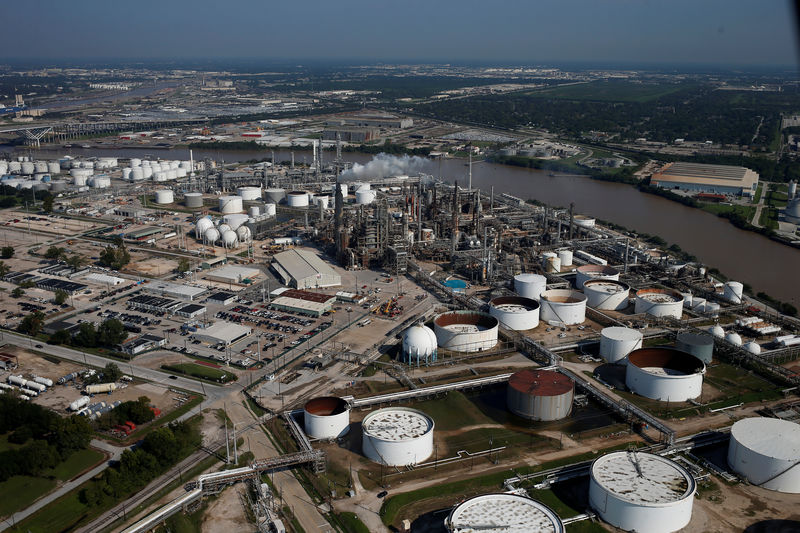By Ron Bousso
LONDON (Reuters) - Refineries around the world are squeezing out every last drop of diesel while drowning in gasoline, in what could well become the new normal for the next few years.
The imbalance is a confluence of major shifts in oil markets - surging production of light U.S. shale oil, plummeting exports of heavier Venezuelan and Iranian crude, weakening gasoline demand and rising diesel consumption.
The coming in 2020 of the biggest change in fuel regulations in decades, when the International Maritime Organisation (IMO) will start requiring ships to use cleaner fuel, is likely to prolong this reality, oil executives and analysts say.
Refineries that distil crude oil into fuel have always had to adapt their output to shifting demand patterns such as high consumption of gasoline in summer and increased demand for heating oil in winter.
But the market for refined products appears out of kilter in a way rarely seen before, and the IMO changes are likely to prolong the imbalance.
"We are witnessing a microcosm of the post-IMO environment," Jefferies analyst Jason Gammel said.
The new IMO regulations will reduce the allowed content of sulphur in shipping fuel, known as bunker fuel, from 3.5 percent to 0.5 percent, increasing demand for diesel at the expense of dirtier fuel oil.
Ahead of the change, refineries invested in equipment to remove more sulphur from crude oil and increase production of diesel. At the same time, a slew of new refineries has come or will come on stream in coming years.
Several long-term changes are further impacting oil refining.
First, gasoline demand is gradually decelerating due to higher engine efficiency, slowing economic growth in China and a gradual expansion of the electric vehicle fleet.
The International Energy Agency has estimated that gasoline demand will grow by "a puny" 80,000 barrels per day in 2018, the slowest expansion since 2011. [IEA/M]
Diesel demand, on the other hand, has been persistently strong due to higher industrial activity in the United States, while global stocks have tightened as a result of lower exports from China and refinery outages.
For a graphic on Diesel vs gasoline (png), see - https://tmsnrt.rs/2PHAhiM
LIGHT AND SWEET
The imbalance has been deepened by the shifting supply of crude oil to lighter, sweet grades that yield less diesel and more gasoline.
Production of light shale oil in the United States surged over the past year, while supply of heavy crudes dropped in Venezuela and Iran, which was hit by newly instated U.S. sanctions this month.
So while historically refineries tweak their crude intake and production yields to adapt to seasonal consumption, this time the acute demand for diesel and lighter crude intake means refiners are opting to maximise output.
In terms of overall refining profits, strong diesel cracks are able to offset slumping gasoline margins.
Refineries have also found support from fuel oil, a "bottom of the barrel" product usually sold at a loss. The abundance of light, sweet crude has pushed up demand for fuel oil, which is blended with lighter crude to increase diesel output.
"We are seeing very healthy demand for diesel and fuel oil and the only weak spot really is gasoline," Dario Scaffardi, chief executive of Italian refiner Saras (MI:SRS), told Reuters.
"The IMO will be very constructive for us, and the question is how constructive. I would agree that this scenario of strong diesel and weak gasoline seems the most reasonable going forward."
Unlike previous years that saw an extreme imbalance between gasoline and diesel, which account for around 70 percent of global refinery output, today's reality is likely to persist.
Refineries will attempt to shift output as much as they can away from gasoline into diesel, said Russell Hardy, chief executive of Vitol, the world's largest oil trader which owns several refineries in Europe.
"As more refineries come on and as more light sweet materials come on ... It is going to tend to weigh heavily on that part of the barrel, which in turn essentially puts all of the onus on distillates to make the refinery margin in 2020," Hardy told the Reuters Commodities Summit in October.
Consultancy JBC Energy expects the abundance of light crude supply in the United States to hinder the ability of refiners to cut gasoline output, while also forecasting that demand in 2019 is unlikely to rebound strongly.
The refineries with the highest diesel production and lowest fuel oil output are generally likely to benefit the most from the IMO changes. Less complex, older plants that have a greater output of gasoline or fuel oil are likely to fall behind.
According to Morgan Stanley (NYSE:MS), in Europe, Spain's Repsol (MC:REP), Turkey's Tupras and Saras are best placed for the IMO changes. In the United States, the largest independent refiner Valero (N:VLO) and in Asia, India's reliance, which operates the world's largest refinery in Jamnagar, are in pole position.

For a graphic on IMO winners and losers (Source: Goldman Sachs (NYSE:GS)), see - https://tmsnrt.rs/2QHziLE